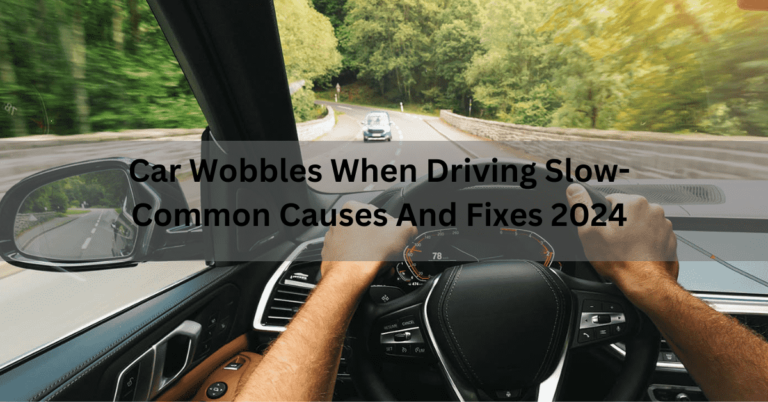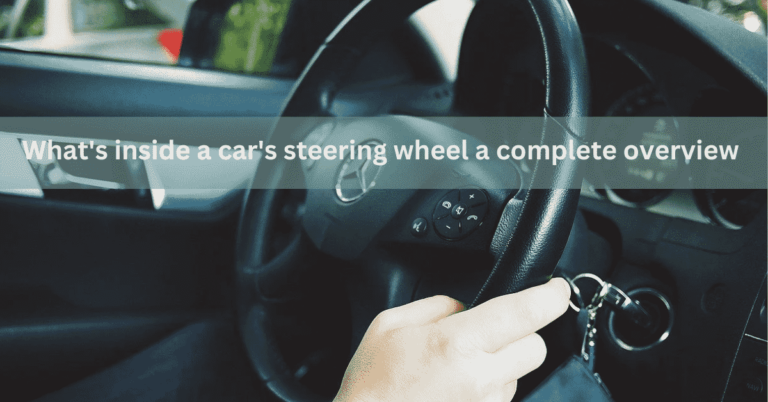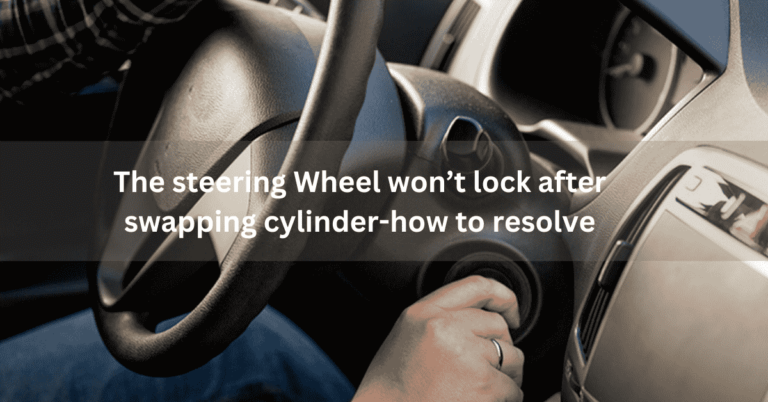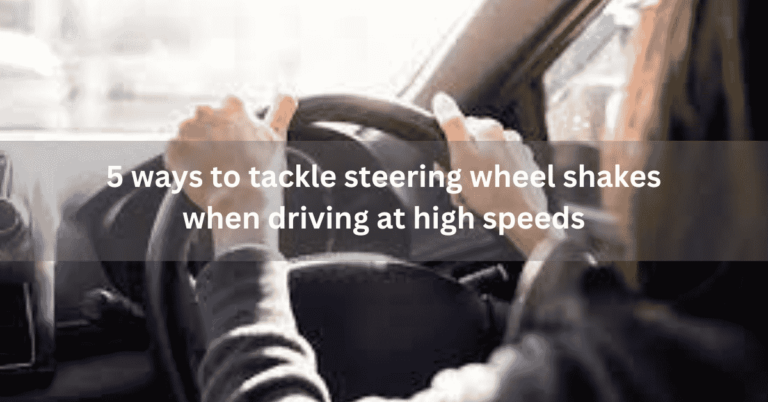Experiencing a Sharp Steering Wheel Jerk After Stops? effective solution
If you experiencing a Sharp Steering Wheel Jerk After Stops. The common reason behind a sharp steering wheel jerk after stops is related to tires.
If the tires are imbalance or worn the it could be issue of shaking steering wheel.
Don’t worry here, I’ll give you the answers and solutions to most of the queries related to this question.
Imagine you are at a red light patiently waiting for the signal to change. As soon as you lift your foot off the brake pedal your steering wheel jerks.
In this blog, you’ll learn the mystery behind this unexpected mini roller coaster.
Possible Causes a Sharp Steering Wheel Jerk After Stops:
Here is a possible causes for Sharp Steering Wheel Jerk After Stops:
Brake Blues:
One potential reason behind this effort may be your brakes need your little attention. Worn-out brake pads or a malfunctioning brake system might be creating problems for your steering wheel jerks.
Suspension Surprises:
Let’s not forget about the main feature of a smooth ride – your car’s shocks and struts. If they’re worn out, they might be passing the jerkiness directly to your steering wheel, turning your cruise into a bumpy adventure.
Steering Irregular:
The steering mechanism itself could be an issue. Whether it’s misalignment or power steering problems, these might be the reason behind your unexpected steering wheel jerks.
Seeking Professional Help:
If you find your vehicle is not good enough to ride. it’s time to pay a visit to your trusted mechanic. A regular check will uncover the root cause, and let’s face it, no one likes surprises when it comes to car trouble.

Also Read:
How Can A Driver Know He Has Turned The Steering Wheel To The Correct Angle?
Why Do Sailing Yachts Have Two Steering Wheels? 7 Reasons
DIY Checks:
When you get the issue of jerking a car in the road. Don’t get panicked. There are a few basic checks which can help you to get rid of this uninvited problem.
- Tire pressure check:
Uneven tire pressure can cause the jerk and make it hard to ride. Maintain the recommended tire pressure specified by your vehicle’s manufacturer.
Regularly check and adjust pressure, including the spare tire. So let’s first check the tire pressure.
- Low fluids level:
Low fluid levels can make your steering system work harder than it should, leading to unexpected jerks. A quick fluid check might save you a trip to the mechanic if that’s the main problem.

Why does my steering wheel shake at high speeds
Here you will find the possible reasons.
| Possible causes | Description |
| Wheel Balance Issues | Uneven weight distribution on tires, often due to wear or hitting potholes, leading to noticeable vibrations. |
| Wheel Alignment Problems | Improper wheel alignment causes the vehicle to pull to one side, resulting in steering wheel vibrations. |
| Tire Problems | Worn-out or unevenly worn tires, incorrect tire pressure, or damage to the tire sidewalls can cause shaking. |
| Brake Issues | Problems like warped brake rotors or uneven brake pad wear can contribute to vibrations, especially when braking.| |
| Suspension System Trouble | Faulty or worn-out suspension components, such as struts or shock absorbers, allow excessive movement. |
| Axle or Drivetrain Problems | Issues with axles or drivetrain components like CV joints or driveshafts, leading to vibrations at higher speeds |
| Wheel Bearing Wea | Worn-out wheel bearings can cause vibrations and are often accompanied by a humming or growling noise. |
| Out-of-Balance Tires | Incorrectly balanced tires can result in vibrations, particularly at higher speeds, due to uneven weight distribution |
Understanding these possible causes can help you pinpoint the issue with your shaky steering wheel.
If you’re unsure or the problem persists, seeking professional inspection and repairs is recommended for a smoother and safer driving experience.
Why does my steering wheel shake at low speeds?
A shaky steering wheel at low speeds could be due to issues like
- Wheel imbalance.
- Tire problems.
- Brake issues.
- Suspension concerns.
- Uneven weight distribution.
- Worn-out tires.
To pinpoint the cause, consider checking tire conditions, inspecting the brake system, and ensuring proper wheel alignment.
If the issue persists, seeking a professional inspection is advisable to identify and address the problem for a smoother ride.
Why is my steering wheel shaking when I brake?
Experiencing a shaky steering wheel when braking is a common concern that several factors can cause:
1. Warped Brake Rotors:
Uneven wear or heat distribution can cause brake rotors to warp, leading to vibrations when braking.
2. Uneven Brake Pad Wear:
If brake pads wear unevenly, it can result in an uneven braking surface, causing the steering wheel to shake during braking.
3. Brake Caliper Issues:
Sticking or unevenly gripping brake calipers can create an imbalance in braking forces, contributing to steering wheel vibrations.
4. Worn Suspension Components:
Worn-out suspension parts, like struts or shocks, can allow vibrations from the braking system to transfer to the steering wheel.
5. Tire Problems:
Uneven tire wear or imbalances can increase vibrations during braking.
If you’re experiencing steering wheel shake when braking, it’s essential to have your brake system inspected promptly.
A professional mechanic can identify the specific issue and recommend necessary repairs to ensure both braking efficiency and a smoother driving experience.
Regular brake maintenance and timely attention to these issues contribute to safer and more comfortable driving.

Also Read:
5 Ways To Tackle Steering Wheel Shakes When Driving At High Speeds
The steering wheel moves back and forth when braking.
Ever felt like your steering wheel is trying out for a salsa dance when you hit the brakes? That unstable back-and-forth movement isn’t just a quirky performance; it could be a sign of underlying issues.
Things like warped brake rotors, uneven brake pad wear, or even loose suspension components might be causing the steering wheel to be shaking.
They’ll unravel the unbalancing routine, fix the issue, and make sure your brakes and steering are in harmony for a safer and smoother ride.
Because when it comes to your car, it’s all about moving forward without the unexpected twists and turns.
Why Steering wheel jerks left and right while driving?
When you are driving and your steering wheel starts jerking left and right, it can be an alarming experience that is both frustrating and stressful.
This issue can be caused by a variety of factors, like as issues with the suspension system, uneven tire wear, misalignment, or issues with the power steering system.
It can make it difficult to maintain control of your vehicle. Every time you feel like you are at risk of losing complete control.
If you notice any unusual noises or vibrations that cause the jerking, it could indicate of serious problem.
It is essential to have your car inspected by a professional mechanic to identify the root cause of the issue and address it promptly.
Ignoring the issue could result in more damage to your vehicle and potential danger to your safety on the road.

Frequently asked questions:
1. Why does my steering wheel suddenly jerk?
A sudden steering wheel jerk can be caused by issues like misaligned wheels, problems with the power steering system, or even a snag in the suspension components.
If your vehicle pulls to one side unexpectedly, it’s time to get it checked to uncover the root cause.
2. Why does my steering wheel jerk when I brake hard?
Jerking during hard braking might point to warped brake rotors, uneven brake pad wear, or issues with the brake calipers.
These problems can cause uneven braking forces, resulting in a noticeable jerk through the steering wheel. Getting your brake system inspected is crucial for both safety and a smoother ride.
3. Why does my steering wheel shake when I come to a stop?
Steering wheel shake during braking could be due to factors like warped brake rotors, uneven tire wear, or problems with the suspension.
These issues become more noticeable as you slow down. Regular brake and suspension inspections can help identify and resolve these concerns.
4. Can alignment cause jerking?
Yes, misaligned wheels can contribute to steering wheel jerking. When your wheels aren’t properly aligned, it can cause your vehicle to pull to one side, resulting in noticeable jerking.
A wheel alignment check and adjustment, if necessary, can address this issue.
5. Can a bad wheel bearing cause jerking?
Absolutely. A failing wheel bearing can cause your steering to jerk, especially during turns. If you hear grinding or rumbling noises along with the jerking sensation, it’s a strong indicator that your wheel bearings might need attention.
6. Is car jerking serious?
Car jerking can vary in seriousness depending on the underlying cause.
Some issues, like misaligned wheels, can be less severe, while others, such as problems with the brake system or wheel bearings, should be serious problem.
Conclusion:
A steering wheel jerking after stopping or during various driving conditions can be attributed to multiple factors. Addressing these issues is important for both safety and a smoother driving experience.
Regular maintenance checks, especially on brakes, suspension, and wheel alignment, can help prevent and identify potential causes of steering wheel jerks.
DIY checks, such as monitoring tire pressure and fluid levels, offer a proactive approach to maintaining your vehicle’s performance.
When faced with steering issues, seeking professional inspection is advisable. A trusted mechanic can diagnose the root cause and provide necessary repairs, ensuring your vehicle operates smoothly and safely.
Remember, a well-maintained steering system contributes to a comfortable ride and is vital to overall driving safety. Stay proactive, address concerns promptly, and enjoy a smoother and more enjoyable time behind the wheel.
Happy driving:







